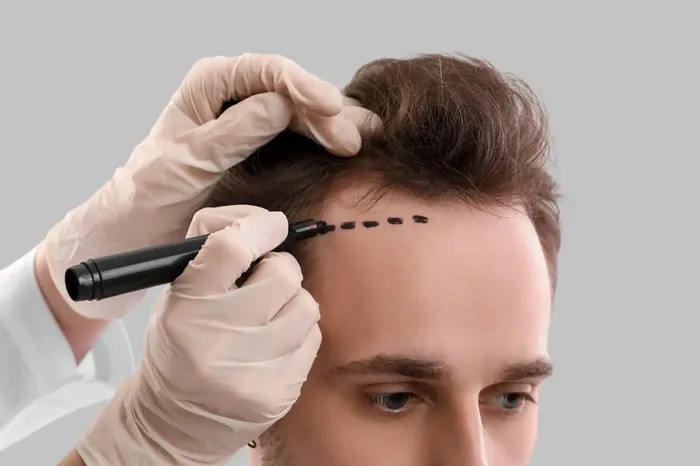Hair transplantation has emerged as a highly effective solution for many individuals struggling with hair loss. By transplanting hair follicles from a donor area to the balding or thinning regions, it can significantly improve the appearance and boost self – confidence. However, not everyone is an ideal candidate for this procedure. Understanding who is not suitable for hair transplant is crucial, as undergoing the surgery under inappropriate circumstances can lead to unsatisfactory results, complications, and potential harm to the patient’s health.
In this comprehensive article, we will explore the various factors that determine unsuitability for hair transplant, ranging from medical conditions to psychological and lifestyle aspects.
Medical Contraindications
Autoimmune Diseases
Individuals with autoimmune diseases such as lupus, rheumatoid arthritis, psoriasis, and alopecia areata are generally not suitable candidates for hair transplant surgery. The overactive immune system in these conditions may reject the transplanted hair grafts, leading to poor outcomes.
Recent History of Cancer
Patients with a recent history of cancer, particularly those who have undergone chemotherapy or radiation therapy, should wait at least 12 to 24 months after completing their cancer treatment before considering a hair transplant. These treatments can affect skin tissue quality and the ability of hair follicles to regenerate and heal properly.
Endocrine Disorders
Uncontrolled diabetes, thyroid disorders, hypercortisolism, hyperandrogenism, insulin resistance, and severe obesity can all negatively impact the scalp’s blood supply and the overall healing process. These conditions must be well-managed before considering a hair transplant.
Heart and Vascular Diseases
Severe hypertension, heart failure, recent heart attack or stroke, and lower limb arterial disease can disrupt blood flow and oxygen supply to the scalp, compromising the survival of hair grafts. These conditions must be stabilized before undergoing a hair transplant.
Coagulation Disorders
Conditions that impair blood clotting, such as hemophilia, thrombocytopenia, thrombocytosis, severe anemia, and sickle cell disease, increase the risk of excessive bleeding during surgery. These conditions are contraindications for hair transplant surgery.
Immunocompromised Patients
Individuals with weakened immune systems, such as those with uncontrolled HIV infection, rare genetic immune deficiencies, or those who have had their spleen removed, are more prone to infections. Hair transplant surgery is generally inadvisable for these patients until their immune function is restored.
Psychological or Psychiatric Contraindications
Severe Body Image Disorders
Patients with body dysmorphic disorder, psychotic disorders, obsessive-compulsive disorders, or trichotillomania may have unrealistic expectations or develop chronic dissatisfaction with the results. These conditions are contraindications for hair transplant surgery.
Depressive Disorders
Severe depressive episodes, especially when accompanied by suicidal ideation, are relative contraindications for hair transplant surgery. It is advisable to stabilize the patient’s mood and alleviate depressive symptoms before considering elective cosmetic surgery.
Addiction to Cosmetic Procedures
Patients who are addicted to cosmetic procedures or have unrealistic expectations regarding the results of a hair transplant are not suitable candidates. It is important for patients to have realistic expectations and understand the limitations of the procedure.
Lifestyle-Related Contraindications
Heavy Smoking
Smoking more than one pack per day can impair blood microcirculation, affecting the viability of implanted hair grafts. Patients should ideally stop smoking a month or two before the transplant and not resume smoking afterward. If this is not possible, cessation 3 weeks before and after the surgery can reduce risks.
Alcoholism
Excessive and chronic alcohol intake can impair scalp vascularisation and graft healing. Patients should drastically reduce alcohol intake when preparing for hair transplant surgery and abstain from alcohol for 3 weeks after the procedure。
Temporary Contraindications.
Pregnancy
It is advisable to postpone hair transplantation if you are actively pregnant or planning pregnancy within one year following the surgery. Hormonal changes during pregnancy can interfere with graft healing and optimal development.
Intense Emotional Stress
Intense psycho-emotional stressors, such as bereavement, separation, or job loss, can complicate the immediate post-operative recovery. It is preferable to postpone hair transplants until the patient is in a more stable emotional state.
Conclusion
While hair transplant surgery is a highly effective solution for many types of hair loss, not everyone is a suitable candidate. Medical conditions, psychological factors, and lifestyle habits can all influence the success of the procedure. It is crucial for patients to undergo a thorough evaluation and consultation with a qualified hair transplant specialist to determine their suitability for surgery. By identifying and addressing potential contraindications, healthcare professionals can ensure the best possible outcomes for their patients.
Related topics:
- Who is not suitable for hair transplant: A Simple Guide
- Who is Not a Good Candidate for Hair Transplant?
- At What Stage is Hair Transplant Not Possible: A Quick Guide


